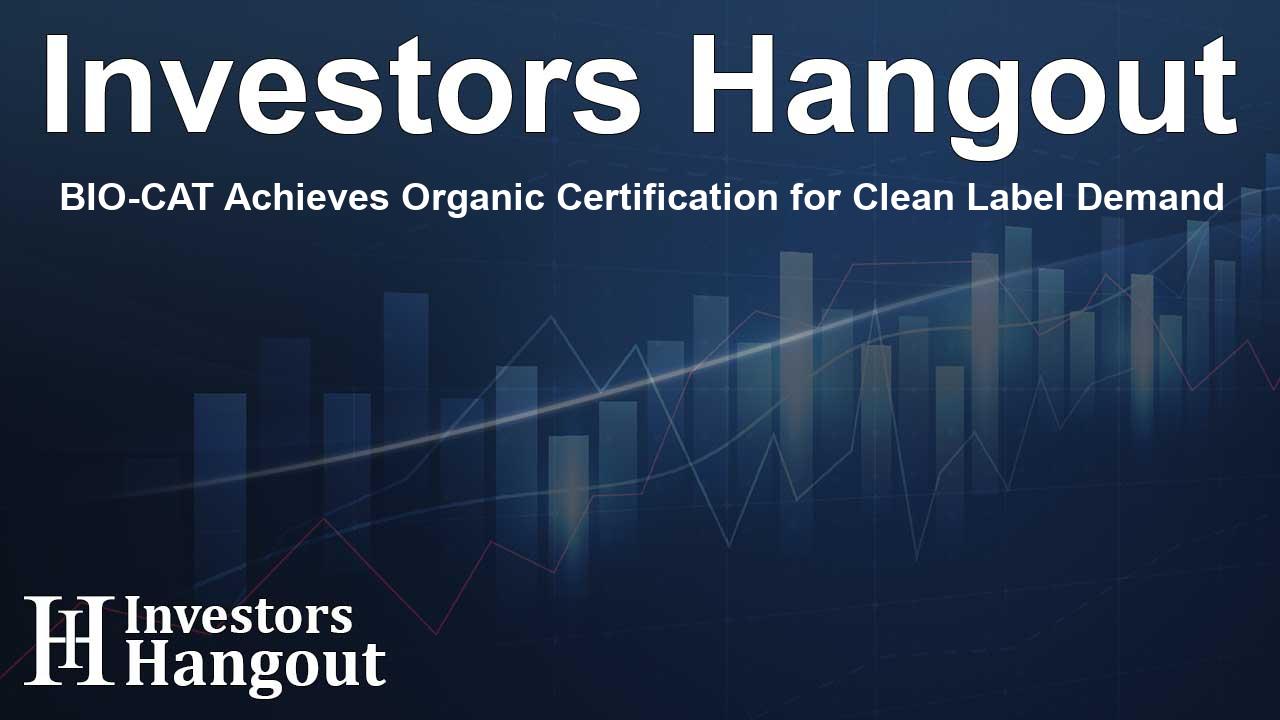BIO-CAT Achieves Organic Certification for Clean Label Demand

BIO-CAT Achieves Organic Certification
As the demand for organic and non-GMO products intensifies, ingredient suppliers must adapt to ever-evolving consumer expectations. With the remarkable growth of the clean-label movement, companies like BIO-CAT and BIO-CAT Microbials are stepping up to the plate, ensuring their offerings align with current market trends.
The Clean-Label Movement
In recent years, there has been a considerable shift in consumer behavior. As more individuals embrace the notion of 'food as medicine,' there has been a recorded increase in the purchase of natural products by 23% and organic products by 22% over a short period. This upward trend highlights a growing preference for clean food choices, emphasizing that the future of food lies in its purity and sustainability.
The Driving Forces Behind Change
Research indicates that natural, organic, and functional product sales have surged by 6.6%, contrasting with a slight decline in conventional product sales. Shoppers are increasingly prioritizing health, transparency, and sustainability, leading them to favor products with USDA Organic or Non-GMO Project Verified seals. In fact, 65% of consumers are more inclined to choose products that showcase these certifications.
Regulatory Support for Organic Food Access
This surge in demand is echoed in policy discussions, with voices calling for greater access to organic foods. Prominent figures assert that all families should have the option to choose clean, organic food. This sentiment pushes major agricultural businesses to be accountable for the ingredients they use and their marketing practices.
The Challenge of Certification
Obtaining organic certification is no small endeavor. It necessitates a detailed inspection process and adherence to stringent federal standards against synthetic pesticides, GMOs, and growth hormones. As brands shift towards cleaner formulations, ingredient suppliers face the challenge of scaling up production without sacrificing quality or integrity.
BIO-CAT’s Commitment to Quality
BIO-CAT and BIO-CAT Microbials are leading the charge in this challenging environment, both recently earning organic certification through Quality Assurance International (QAI). This esteemed certification also applies to their flagship products, including the OPTIZIOME P3 HYDROLYZER and the OPTIBIOME BS50. According to Robert Boyd, Director of Compliance at both companies, this achievement is a testament to their commitment to quality and integrity in their operations.
Industry Leadership in Clean Ingredients
As pioneers in enzyme solutions and microbial strain development, these companies recognize the importance of organic certification in maintaining their leadership status. CEO Chris Schuler notes that the companies are dedicated to supporting the organic movement by providing robust, non-GMO enzyme and microbial solutions.
Future Prospects and Customer Relations
BIO-CAT is actively engaging with industry stakeholders to share its achievements and products at renowned exhibitions, showcasing its expanded offerings in the organic sector. For further insights into BIO-CAT and its commitment to clean-label production, potential customers can reach out to Corporate Affairs directly.
Frequently Asked Questions
What is organic certification?
Organic certification verifies that products meet strict environmental and safety standards, ensuring they are free from synthetic pesticides, GMOs, and growth hormones.
Why is the clean-label movement important?
The clean-label movement is significant as it promotes healthier, transparent food choices, responding to consumer demands for safer, non-toxic food products.
What products does BIO-CAT offer?
BIO-CAT provides certified organic and non-GMO enzymes and microbials tailored for health-conscious brands seeking clean-label solutions.
How does consumer behavior impact product offerings?
Increasing consumer preferences for health and sustainability force companies to rethink and improve their product formulations, catering to these demands.
What role does policy play in organic food access?
Policy initiatives promote greater access to organic foods, advocating for accountability among food producers in their ingredient selections and marketing strategies.
About The Author
Contact Ryan Hughes privately here. Or send an email with ATTN: Ryan Hughes as the subject to contact@investorshangout.com.
About Investors Hangout
Investors Hangout is a leading online stock forum for financial discussion and learning, offering a wide range of free tools and resources. It draws in traders of all levels, who exchange market knowledge, investigate trading tactics, and keep an eye on industry developments in real time. Featuring financial articles, stock message boards, quotes, charts, company profiles, and live news updates. Through cooperative learning and a wealth of informational resources, it helps users from novices creating their first portfolios to experts honing their techniques. Join Investors Hangout today: https://investorshangout.com/
The content of this article is based on factual, publicly available information and does not represent legal, financial, or investment advice. Investors Hangout does not offer financial advice, and the author is not a licensed financial advisor. Consult a qualified advisor before making any financial or investment decisions based on this article. This article should not be considered advice to purchase, sell, or hold any securities or other investments. If any of the material provided here is inaccurate, please contact us for corrections.
